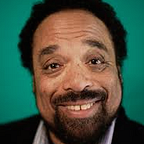Author Alice Sebold Accused Multiple Innocent Black Men of the Same Rape. One Served 16 Years.
Several weeks ago a prosecutor and a judge exonerated Anthony Broadwater, an innocent man who had been convicted and served over 16 years in prison for the rape of now-famous writer Alice Sebold — author of “The Lovely Bones” and “Lucky”. It turns out 40 years ago Sebold had accused two different innocent black men of her brutal rape.
The hero who uncovered this is movie producer Timothy Mucciante, who somehow became the first person to care that in her bestselling 1999 memoir “Lucky”, Sebold mentioned that when presented a police lineup, she didn’t recognize Broadwater and accused a different man.
Prosecutors replied by falsely telling her the two men knew each other and were trying to fool her, so in court she testified against the man they told her to accuse. Both men were innocent and the rapist has never been found.
Throughout over 16 years in prison, Broadwater consistently maintained he was innocent. Before completing his sentence, he was denied parole at least five times because he wouldn’t confess — despite passing lie detector tests.
Because of his felony conviction and sex offender status, Broadwater has not had secure housing, employment or more than a handful of friends in the decades since his release from prison.
— — — — — — — — — — — —
Forty years after the rape, producer Mucciante was trying to make sense of inconsistencies in the “Lucky” story, which he was helping make into a Netflix movie. In a draft of the screenplay, the rapist was white.
In Justice At Last in People, Chris Harris writes:
Mucciante began to doubt Broadwater’s guilt the first time he read Sebold’s book, especially in the lineup scene where she identified a different man as her attacker. “Anybody who watches Law & Order knows that if a person cannot identify their assailant at the lineup, that’s the end of the case as it relates to that assailant. They don’t just say, ‘Well, we’re going to try you anyway,’
Mucciante soon saw Broadwater was innocent, quit the movie project, hired a detective, and his case was proven in 48 hours.
A week after Broadwater was exonerated in court, Alice Sebold wrote what’s being called an “apology” and published it on Medium. While she uses the word “sorry”, she doesn’t mention anything she did, or who the prosecutors were who convinced her to accuse Broadwater under oath. (None of the recent news stories name them either.) She doesn’t mention that she pointed to the only black man in the courtroom and insisted he had raped her after telling police she didn’t recognize him. A skilled writer, Sebold uses passive voices: “I deeply regret what you have been through” and “I will forever be sorry for what was done to him” — truly universal messages that I could honestly say myself, although no one would conclude I was apologizing.
The Netflix “Lucky” movie project has been cancelled. Instead of publishing an update describing Broadwater’s exoneration, after reaping millions in sales Scribner has swiftly removed the book from publication.
Broadwater’s new friend Timothy Mucciante is producing a documentary about him entitled “Unlucky”.
There is a GoFundMe for Mr. Broadwater and his family. From what I can tell, my modest contribution has already done more than Sebold, Scribner or Netflix to help him. You can help too. https://gofund.me/08c651d5
Image of Related Recent News in my search today:
The New York Times account of Broadwater’s story:
The Associated Press / NBC News reports:
… After Broadwater was arrested, though, Sebold failed to identify him in a police lineup, picking a different man as her attacker because “the expression in his eyes told me that if we were alone, if there were no wall between us, he would call me by name and then kill me.”
Sebold wrote in “Lucky” that when she was informed that she’d picked someone other than the man she’d previously identified as her rapist, she said the two men looked “almost identical.”
She wrote that she realized the defense would be that: “A panicked white girl saw a black man on the street. He spoke familiarly to her and in her mind she connected this to her rape. She was accusing the wrong man.”
